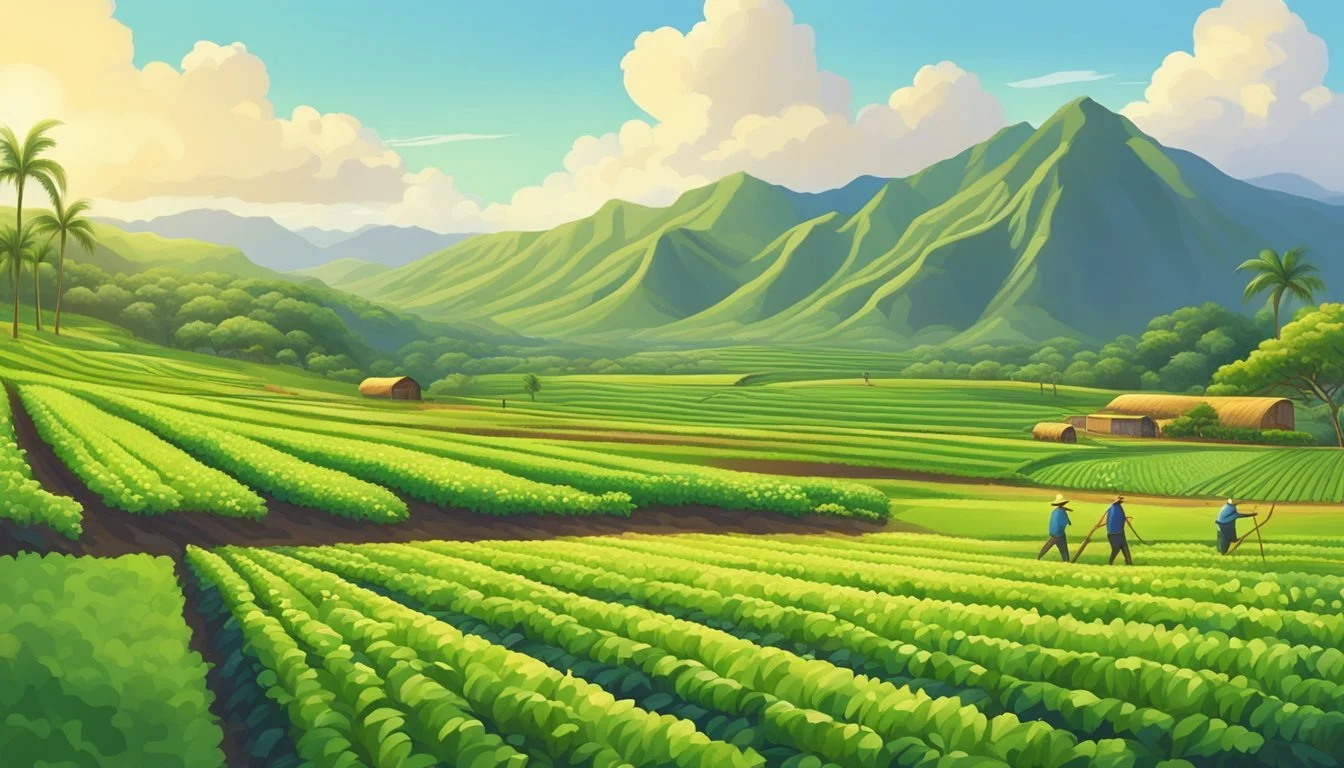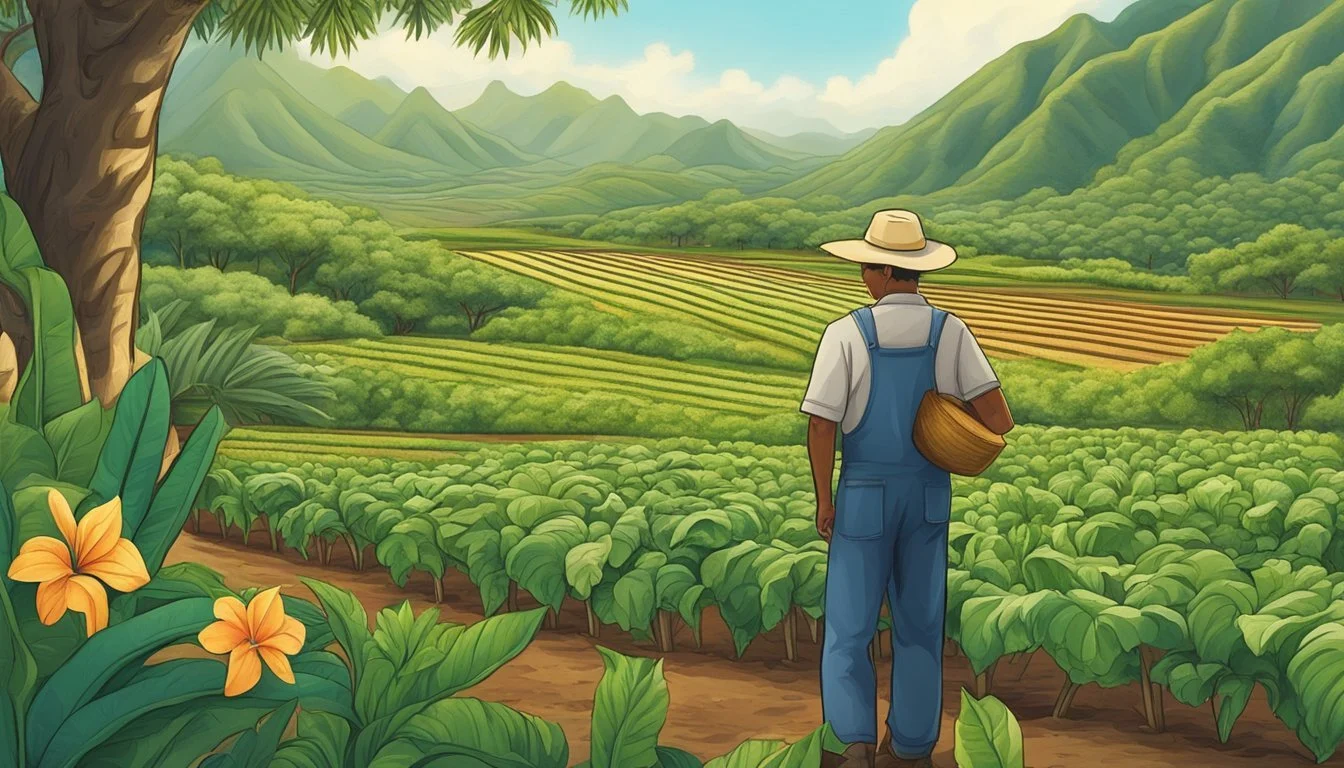Farming Grants Hawaii
Opportunities for Sustainable Agriculture Growth
In Hawaii, the agricultural sector plays a vital role in local food security and economic stability. Recognizing this importance, a variety of grants and financial assistance programs are designed to support farmers and ranchers across the islands. With food security being a major concern, these financial incentives are geared toward enhancing the state's capacity to produce its own food and reduce dependence on imports.
To bolster small-scale agricultural efforts, programs like the Micro-Grants for Food Security Program provide crucial funding for gardening, herding, and livestock operations. This initiative, supported by the Hawaii Department of Agriculture and funded by the U.S. Department of Agriculture under the 2018 Farm Bill, demonstrates a commitment to empowering local food producers. Eligibility for these grants typically requires residency and meets certain age and household criteria, ensuring that the funding impacts those who contribute directly to the community's food resources.
Additionally, organizations like the Oahu Agriculture and Conservation Association offer comprehensive lists of available grants and loans, supporting wider access to financial resources. These offerings are supplemented by the efforts of the USDA Farm Service Agency, which administers various programs on a national scale, though tailored to meet the needs of Hawaii's unique agrarian landscape. These programs present opportunities for local agricultural entrepreneurs to sustainably grow their operations and reinforce Hawaii's agricultural resilience.
Overview of Farming Grants in Hawaii
Hawaii offers a variety of grants and financial aid programs for farmers through the state's Department of Agriculture, the U.S. Department of Agriculture, and various local organizations. These programs are designed to support the agricultural sector, which is crucial for the state's sustainability and self-sufficiency.
State Programs: The Hawaii Department of Agriculture (HDOA) is committed to assisting small-scale farmers in enhancing food security. The Micro-Grants for Food Security Program (MGFSP), for example, is particularly tailored for small growers to increase local food production. These grants are part of the state's strategy to encourage gardening, herding, and livestock operations.
Federal Programs: The 2018 Farm Bill has facilitated numerous federal initiatives that are managed statewide by entities such as the USDA Farm Service Agency. These include:
Livestock Forage Program (LFP)
Livestock Indemnity Program (LIP)
Emergency Assistance for Livestock, Honey Bees, & Farm-raised Fish (ELAP)
Supplemental Assistance Revenue Payment (SURE)
Tree Assistance Program (TAP)
Additionally, conservation programs like the Conservation Reserve Program (CRP) and the Grassland Reserve Program (GRP) are available to promote environmental stewardship and sustainable practices.
Local Opportunities: Local organizations such as the Oahu Agriculture and Conservation Association (OACA) curate broad listings of available grants and loans, catering to the needs of Hawaii’s diverse agricultural community.
Market Development: Efforts to assist farmers in Hawaii also extend to market development, ensuring farmers not only produce but also effectively sell their products, both locally and beyond state borders.
In sum, Hawaii offers a range of grant programs aimed at strengthening the state's farming industry, from micro-grants for food security to market development initiatives. These grants are critical for the support of local farmers and the overall growth of Hawaii’s agricultural landscape.
Eligibility and Application Guidelines
The section outlines the requirements and procedural steps for farmers and organizations in Hawaii seeking to apply for agricultural grants. It provides detailed instructions on establishing eligibility, navigating the application process, meeting important deadlines, preparing necessary documentation, tips for successful grant submission, and accessing assistance.
Determining Eligibility
To be eligible for agriculture grants in Hawaii, applicants typically must be Hawai`i residents and involved in small-scale farming or agricultural operations. Grants often target areas with higher food insecurity indexes. Eligibility criteria may also extend to non-profits and organizations that support agricultural development.
Application Process
The application process usually starts with reviewing guidelines available on the Hawaii Department of Agriculture (HDOA) website or the State Procurement Office. Interested parties should look for the Request for Proposals (RFP) on relevant websites such as the Market Development Branch website at hdoa.hawaii.gov/add/md/. Detailed instructions for submission are provided within each RFP.
Important Deadlines
Deadlines for grant submissions are strictly enforced. Applicants can find deadline information on the announcement sections of the HDOA website or Market Development Branch website. It's important to mark these dates early to ensure timely submission of applications.
Supporting Documentation
Required documentation typically includes proof of residency, outline of the agricultural project, and evidence of farming operations' scale. All supporting documents must be prepared in accordance with the RFP guidance.
Grant Submission Tips
For a successful grant application, applicants should adhere to RFP instructions, present a clear and concise plan, and demonstrate how the grant will address food insecurity or aid in agricultural development. Be thorough but brief in descriptions, and ensure that the amounts requested are justifiable.
Contact Information for Assistance
Applicants seeking help can contact the Market Development Branch via email or phone, as listed on the HDOA website. Some grant programs may offer informational sessions, such as a Zoom webinar, to assist potential applicants in understanding the requirements and application process.
Remember, each grant program may have variations in eligibility and application requirements. It is crucial for interested parties to review all guidelines carefully and reach out for support when needed.
Types of Farming Grants Available
In Hawaii, a diverse range of grants is available to support local agriculture, each tailored to specific aspects of farming. These grants are aimed at enhancing food security, enabling infrastructure development, and encouraging innovation among small-scale farmers.
Micro-Grants for Food Security
The Micro-Grants for Food Security Program targets areas of food insecurity, providing funding for small-scale gardening and livestock operations. Farmers can use these grants to acquire seeds, plants, animals, and tools necessary to increase local food production.
Grants for Equipment and Infrastructure
Available grants for equipment and infrastructure are designed to assist farmers with purchasing soil amendments, irrigation systems, and other essential infrastructure. This fosters enhanced productivity and sustainability on their farms.
Agricultural Development Grants
Agricultural Development Grants address broader aspects of agriculture, offering financial aid for projects that include market development and agricultural innovation. These grants are often facilitated through Hawaii's Market Development Branch to ensure a steady growth in agriculture sector capabilities.
Livestock and Herding Support Grants
These grants aid in livestock and herding support, providing financial resources for fencing, animal purchases, and repairs. They are critical for small-scale herding and livestock operations, ensuring the welfare and expansion of livestock populations.
Small Farmer Support Grants
Small Farmer Support Grants specifically support farmers with limited resources. These grants help in the acquisition of composting equipment, towers, and canning equipment, contributing to the viability and prosperity of small farming operations.
Innovation and Sustainability Grants
Finally, Innovation and Sustainability Grants encourage the adoption of innovative practices like aeroponic and hydroponic farming. They support the employment of sustainable methods that increase efficiency and have a lower environmental impact.
Funding Opportunities and Resources
The Hawaiian agriculture sector offers a variety of funding opportunities designed to support farmers and ranchers. These resources include state and federal programs, as well as private and non-profit grants, and loan options specifically tailored for agriculture.
State Funding Resources
In Hawaii, the Department of Agriculture's Market Development Branch actively works towards promoting local agricultural products. The state provides various grant opportunities designed to assist farmers and ranchers in enhancing their production and marketing capabilities.
Grants: State-funded grants are periodically available for eligible applicants.
Market Development: The branch aids in market expansion for local products.
Federal Funding Programs
Federally, the U.S. Department of Agriculture (USDA) administers numerous programs. Since the 2018 Farm Bill, there has been a heightened focus on supporting local food systems.
Farm to School Grants: Schools in Hawaii like the Connections Public Charter School in Hilo have benefitted from these grants to promote farm-to-school programs.
USDA Funding/Loans: The USDA offers various funding options and loans catering to the needs of the agriculture community.
Private and Non-profit Funding
Beyond government options, private and non-profit organizations provide grants and funding benefiting agriculture.
Private Grants: Organizations offer grants for sustainable food and agriculture initiatives.
Non-profits: Various non-profits focus on specific agricultural sectors or practices, such as organic farming.
Loan Programs for Farmers
Loan options are available from entities like the Farm Credit system and other financial institutions specializing in agricultural financing.
Farm Credit: Offers loans specifically designed for farming needs.
Agricultural Loans: These loans are crafted to help farmers manage the financial demands of running a farm business.
The integration of state and federal resources with private sector funding ensures a comprehensive support system for Hawaii’s agricultural community. Through grants, loans, and market development initiatives, farmers and ranchers are able to access the necessary resources to grow and thrive.
Maximizing Grant Utilization
To effectively utilize farming grants in Hawaii, recipients should focus on implementing agricultural best practices, embracing sustainable farming techniques, expanding food distribution and market access, and engaging with community stakeholders.
Agricultural Best Practices
Farmers can optimize grant funding by adopting best practices in agriculture, ensuring optimal land use and crop health. They may invest in soil amendments to enrich soil quality or utilize high-efficiency irrigation systems, directly impacting plant vitality and yield.
Sustainable Farming Techniques
Sustainable farming hinges on methods that maintain ecological balance. Grants can fund innovative systems like aeroponic systems and garden towers for vegetable production, as well as the implementation of shade houses to protect crops from the harsh Hawaiian sun. These techniques help in water conservation and enhancing food security.
Food Distribution and Market Expansion
Grants can empower farmers to expand their reach through the Market Development Branch, which aids in the sale of food commodities. Investing in food preservation and optimized supply chains contributes to expanding access to local consumption, fostering community resilience and food security.
Community Impact and Engagement
Effective grant use involves bolstering community engagement, where entities such as non-profits, religious organizations, food banks, and food pantries play pivotal roles. Initiatives that align with the grant's objectives might support these stakeholders in increasing knowledge of food security and ensuring widespread benefit from agriculture projects.
Understanding the Impact of Grants
Grants play a crucial role in fostering sustainable agriculture in Hawaii by providing financial assistance to farmers and contributing to food security and community development.
Success Stories and Case Studies
Numerous farmers in Hawaii have benefitted substantially from grant programs. For example, initiatives like GoFarm Hawaii have supported the next generation of farmers with a $1 million gift establishing a matching grant program, which aids in business growth for graduates. These success stories reflect a positive impact on food security and economic growth in the local community.
Statistics and Food Security Metrics
The Kohala Center's efforts have been particularly noteworthy, securing grants worth $50 million since 2012 with a comparably modest funding amount. Between 2019 and 2022, the Office of Agricultural and Community Affairs (OACA) has secured $4.1 million for over 200 clients, showcasing the remarkable potential of grants in enhancing Hawaii's food security metrics.
Economic and Social Benefits
Grants contribute to the economic and social welfare of rural communities. According to the Department of Agriculture, during economic hardships, grants and loans become critical for farmers, ranchers, and growers. This support leads to community development and helps maintain the vitality of the state's farming sector, a cornerstone of Hawaii's economy and cultural identity.
Challenges and Considerations
Despite the successes, obtaining grants can be fraught with challenges. Farmers must navigate complex application processes and meet stringent requirements. State and federal agencies, like the USDA Farm Service Agency, offer loan guarantees and oversight, but the bureaucratic process can be a barrier. Additionally, ensuring that grants achieve their intended socio-economic impact within the community and across the state is a continuous consideration for both awardees and grantors.






